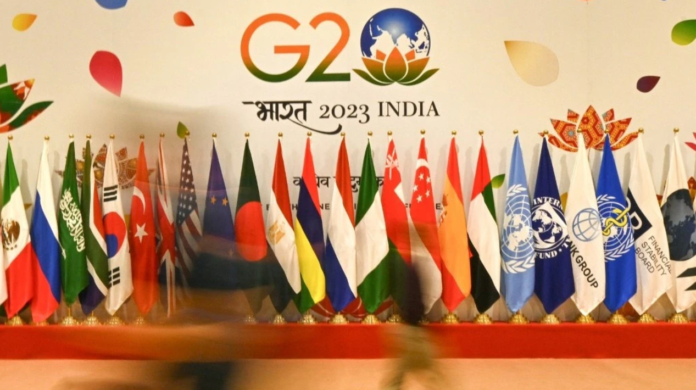Clinches New Delhi Declaration
IndiGlobal Bureau
On the opening day itself, India’s Presidency achieved success. In a dramatic way, PM Modi stopped proceedings to make an announcement. “I have just got some good news right now,” Mr Modi said and added, “Due to the hard work of our team and your support, we have achieved consensus on the New Delhi G-20 Leaders’ Summit Declaration. I propose we adopt this Leaders’ Declaration.”
G-20 members agreed to make a joint statement, forging consensus on the contentious ‘Ukraine paragraphs’ and accepted the membership of the African Union into the grouping. External Affairs Minister S. Jaishankar and India’s G-20 Sherpa said that the consensus had come about due to the stand taken by Indonesia, India, Brazil and South Africa, consecutive hosts of the G-20. Prime Minister Modi said the inclusion of the African bloc would enhance the effectiveness of the G-20.
The declaration of 83 paragraphs contained many agreements as a part of the Finance Track. Agreement to strengthen multilateral development banks, more clarity on crypto currencies and use of digital public infrastructure for financial inclusion gains found currency. Notably, plans for debt distress for vulnerable countries were a highlight.
A major breakthrough has been on the climate change front from financing for “$U.S. 5.8.-5.9 trillion in the pre-2030 period for developing countries as well as $U.S. 4 trillion per year for clean energy technologies by 2030 to reach net zero by 2050.
The Delhi Declaration
On Ukraine War
Use of threat or use of nuclear weapons is inadmissible. All states must act in a manner consistent with the purposes and principles of the UN Charter in its entirety
On Terrorism
Condemned terrorism in all forms and manifestations, including those on the basis of xenophobia, racism or in the name of religion or belief
On Religion
Deplored all acts of religious hatred against persons without prejudice to domestic legal frameworks, including against religious symbols and holy books
On Global Economy
Called for a strong sustainable and inclusive growth as an answer to uneven recovery the world has seen from the pandemic-infused plunder
On Cross-border
Payments Resolved to promote faster, cheaper and more transparent and inclusive cross-border payments as envisaged in the G20 roadmap for Enhancing Cross-Border Payments
On Climate
To achieve net-zero emissions by 2050 and developing countries will require approximately $4trillion annually by 2030
On Agriculture
Committed to facilitating open, fair, predictable and rule based trade in agriculture, food and fertilizers and not impose export curbs in line with WTO rules.
On Gender
Committed to close gender gaps, promoting full, equal, effective women’s participation in the economy as decision makers
On Corruption
Reaffirmed commitment to zero tolerance for corruption; reaffirmed support to enhance efforts to seize, confiscate and return criminal proceeds to victims and states
On Skills
Committed to addressing skill gaps, promoting decent work and ensuring inclusive social protection policies for all to effectively addressing global skills for sustainable and inclusive economic development
On Crypto
Assets Endorsed the financial stability Board’s recommendations on regulation, supervision and oversight of crypto assets to mitigate risks associated with such an ecosystem
On Education
Recognised the importance of investment in supporting human capital and foundational learning-literacy, numeracy and socio- emotional skills as the primary building block for education and employment

 The turnaround can be attributed to investor friendly policy, akin to the one that the Government of India took in 1991 with the New Economic Policy. The several steps that Telangana took includes: speedy clearance aided by a single window, 100 per cent refund on VAT and GST, refund on stamp duty, exemption from Land Ceiling Act, exemption from electricity wheeling charges and not running around to get approval from the State Pollution Control Board.
The turnaround can be attributed to investor friendly policy, akin to the one that the Government of India took in 1991 with the New Economic Policy. The several steps that Telangana took includes: speedy clearance aided by a single window, 100 per cent refund on VAT and GST, refund on stamp duty, exemption from Land Ceiling Act, exemption from electricity wheeling charges and not running around to get approval from the State Pollution Control Board. The most visible area of the state’s renewable energy push has been in public transport system. The Telangana State Road Transport Corporation (TSRTC) for instance teamed up with TSREDCO to install solar rooftop systems on the bus stations, bus depots and workshops. In all, 97 bus depots and 364 bus stations have been covered and the savings are over Rs 2 crore per annum. What is more! It resulted in reduction in carbon emissions by 7,300 tonnes a year.
The most visible area of the state’s renewable energy push has been in public transport system. The Telangana State Road Transport Corporation (TSRTC) for instance teamed up with TSREDCO to install solar rooftop systems on the bus stations, bus depots and workshops. In all, 97 bus depots and 364 bus stations have been covered and the savings are over Rs 2 crore per annum. What is more! It resulted in reduction in carbon emissions by 7,300 tonnes a year.